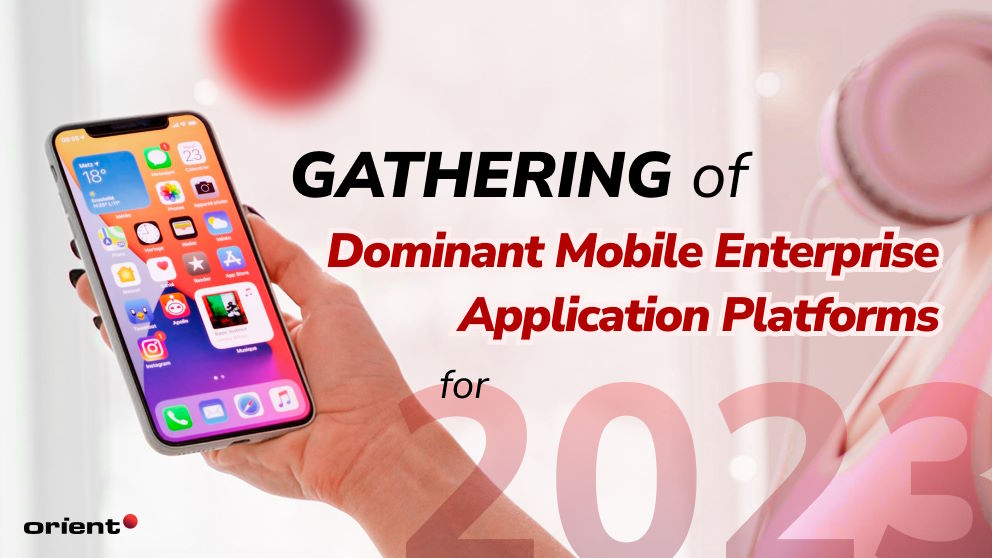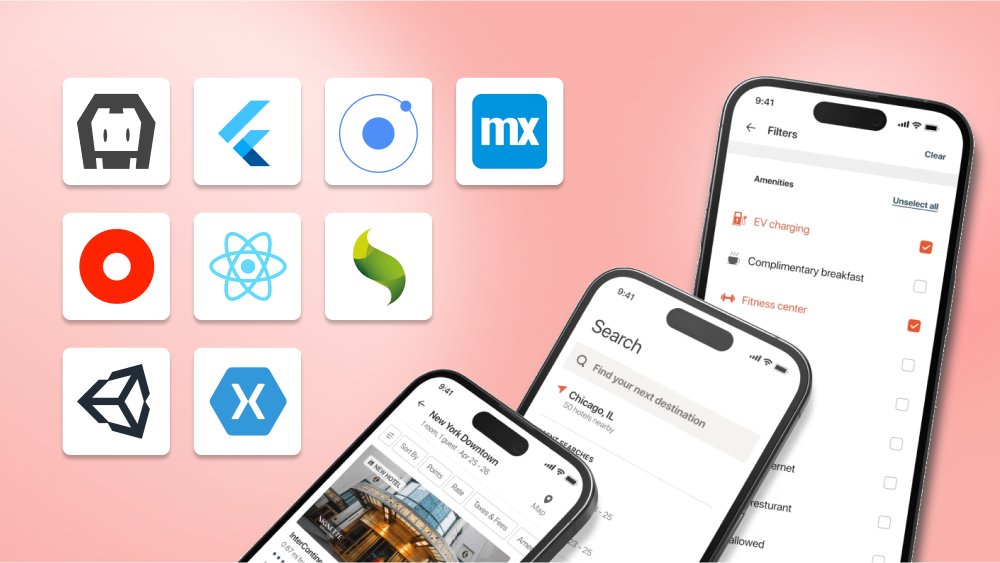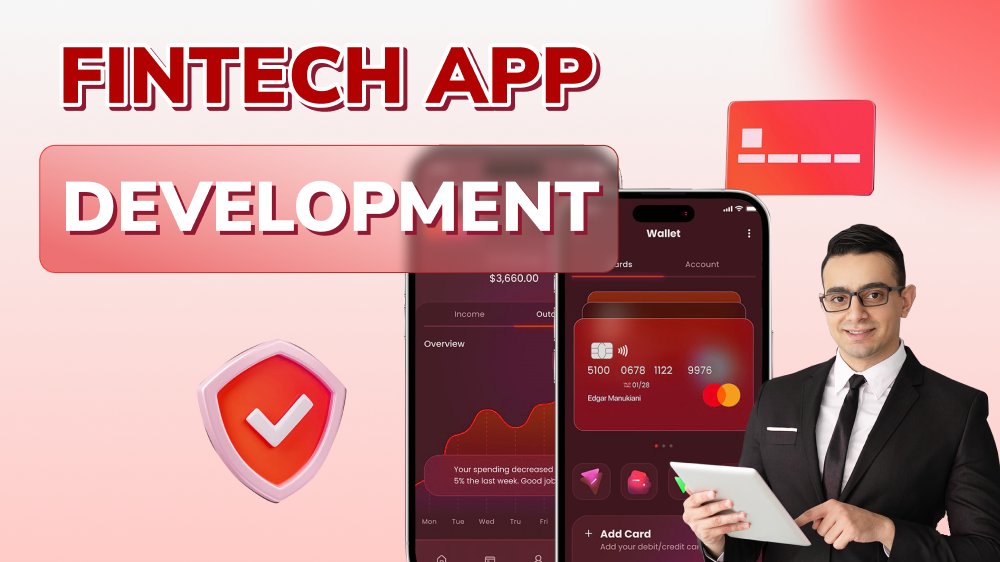Gathering of Dominant Mobile Enterprise Application Platforms for 2023

Content Map
More chaptersThe number of mobile devices is expected to increase to 18.22 billion by 2025, up by 4.2 billion devices from 2020. With the development of mobile technology, mobile devices gradually become an indispensable part of human life. The number of users increases at a breakneck pace every year, making the need for mobile apps more urgent than ever. Seizing this golden opportunity, businesses in all fields put their hand in the competition of developing enterprise mobile applications to create competitive advantages and reap substantial potential profits. However, standing out from the competitive market with thousands of available enterprise mobile apps can be a daunting task.
There are many factors contributing to the success of a mobile application, such as execution, marketing strategies, product ideas, etc., in which the choice of mobile enterprise application platforms can indeed play a significant role in achieving success by speeding up the software development process and reducing product complexity. As each mobile app development platform offers distinct pros and cons, which option best suits your business processes and requirements?
List of Most Popular Mobile Enterprise Application Platforms in 2023
Since almost every mobile enterprise application platform contains two main components, including a mobile middleware server and a mobile client application, they all operate in the same way. It is the construction with many different features that makes each platform have its own unique color. If your business intends to kick off the journey of building an enterprise mobile application, check out the list below to find the best option.
Flutter

Created by Google, Flutter is one of the mobile enterprise application platforms that has been popular with many people in recent years and promises to continue to gain popularity in 2023. This open-source UI software development kit (SDK) specializes in building natively compiled mobile, web, and desktop applications from a single codebase. In other words, Flutter allows any user to freely write code once and deploy it throughout multiple platforms like Android, iOS, Windows, MacOS, and Linux.
Flutter helps developers simplify the visually appealing and interactive user interface-creating process that caters to distinct design requirements by offering a collection of comprehensive customized widgets. With the help of the “hot reload” feature, businesses can instantly see changes made in the code reflected on the app’s interface without restarting, leading to a shorter development process and enhanced productivity.
NativeScript
NativeScript is a particularly suitable choice for businesses that need to build native mobile enterprise apps. As a product of Telerik, a subsidiary of Progress Software, NativeScript allows mobile developers to create cross-platform mobile applications using JavaScript or TypeScript. Similar to Flutter, it allows businesses to share code across platforms, making it effortless and time-saving to create high-quality mobile apps for both iOS and Android.
In addition, NativeScript also supports popular JavaScript frameworks, Angular and Vue.js, for example, helping developers leverage their existing skills and libraries. With a rich set of UI components available, this mobile application platform is easily used, even with new arrivals.
Fliplet
You don’t need to know how to code to create mobile apps or web apps, as Fliplet is a no-code/low-code platform. By combining open-source customization and visual editing, Fliplet allows users without coding knowledge to build apps easily while tailoring to specific needs. This low-code development platform currently has 16 solutions and over 300 customizable screens. With just simple operations like drag and drop, Fliplet saves product development time and quickly brings your development idea to life with the least effort.
Google AppSheet
Google AppSheet is another mobile enterprise application platform that allows users to build custom web and mobile applications without the need to write traditional code. Its spreadsheet-style interface and re-built templates are among the many elements that make Google AppSheet easy to use. Because it is part of the Google Cloud ecosystem, this platform provides users with convenient integration with other Google Cloud services, including Google Drive, Google Sheets, and Google Maps, which all expand the capabilities and possibilities for application development.
However, it’s important for businesses to note that the compressed data size in Google AppSheet is limited to only 10MB based on the mobile device for all the data in one app.
React Native
Mobile developers are no longer strangers to Facebook’s open-source framework, React Native. Unlike other enterprise application development platforms, React Native specializes in supporting the development of mobile apps using JavaScript frameworks, including React, Angular, Vue.js, etc. The reason React Native is able to provide a native app experience is by using native components and APIs instead of a web view.
Furthermore, this platform also has the ability to integrate with existing native code written in Java, Swift, or Objective-C, helping users reuse native modules or implement needed platform-specific functionalities. Although it is a popular choice for building mobile enterprise applications, React Native is only suitable for software developers with technical expertise.
OutSystems
OutSystems is a mobile enterprise application platform with the ability to build and manage enterprise-grade mobile and web applications efficiently. With a visual environment that integrates many pre-built templates and drag-and-drop components, it is easy to use and suitable for all types of users, from professionals to citizen developers. OutSystems provides the richest set of features for applications running on multiple operating systems and devices that you have ever seen.
In particular, the ability to integrate with multiple server data sources and APIs is one of the key features of the platform. Integration support helps software developers upgrade the existing resources and incorporate advanced features. Some other features of OutSystems include AI-powered development assistance, robust security features, built-in user feedback mechanisms, and automatic code documentation.
Zoho Creator
Zoho Creator is an application development platform that allows users to create their own products with little or even no deep understanding of coding. Users can use Zoho Creator for a variety of use cases like CRM, project management, inventory management, etc., and tailor the apps to their specific needs. With Zoho Creator, users can do everything from automating workflows and generating reports and dashboards to designing forms and integrating with other systems, leading to flexible user experiences.
One benefit of using Zoho Creator is its ability to enhance user engagement and collaboration. Only by sharing the software solutions with other team members, customers, or clients can you collaborate with teammates in real-time and receive corresponding feedback.
Xamarin
Owned by Microsoft, Xamarin is one of the most popular open-source frameworks dedicated to building and managing cross-platform mobile apps. By leveraging the C# modern programming language and the .NET framework, Xamarin offers a familiar and powerful coding environment suitable for building mobile applications that require high performance. With the concept of “write once, run anywhere,” which means writing the app logic once and then deploying it on different platforms, Xamarin helps developers save development time and ensure a seamless user experience across multiple devices.
Ionic
Built on AngularJS and Apache Cordova, Ionic is a platform that allows developers to create hybrid mobile applications widely using known web technologies such as JavaScript, HTML, and CSS. Without the need to enhance technical knowledge, developers can now easily and quickly transition into mobile app development. Ionic provides not only many UI components and plugins that simplify the software development process, but it also offers a command-line interface (CLI) that can automate tasks such as project setup, building, testing, and deployment.
Ionic constantly evolves in the technology industry with regular updates, new feature releases, and bug fixes, making it an ideal place for developers to develop software, share experiences, and seek guidance.
Sencha
Sencha is known as a web application development framework that allows developers to build cross-platform web apps using JavaScript, HTML5, and CSS3. However, with the emergence of Sencha Touch and Ext JS framework, which are specifically designed for mobile app support, Sencha is also used to build cross-platform and data-intensive mobile apps. While Sencha Touch provides users with a wide range of UI components, Ext JS offers a rich set of UI components, tools, and libraries, all facilitating the creation of stunning and feature-rich mobile apps.
Apache Cordova

Formerly known as PhoneGap, Cordova is an open-source mobile development framework for developing hybrid mobile applications that can run on multiple operating systems. Cordova acts as a bridge between native device capabilities and web technologies, which allows developers to access native features and leverage their existing web development skills in mobile app development.
Cordova has gained popularity due to its flexibility and ease of use. By enabling developers to create cross-platform mobile apps using standard web technologies, this platform eliminates the need for separate native codebases. Developers only need to build once and deploy to various platforms, from iOS and Android to Windows.
Alpha Anywhere
By creating a low code environment, Alpha Anywhere provides all types of users with a convenient solution to build cross-platform mobile and web applications. The key features available on this rapid application development (RAD) platform are diverse, including offline data access, security controls, and extensive support for building enterprise-grade applications. Regarding data integration capabilities, Alpha Anywhere supports developers to integrate with popular databases, cloud storage services, and other systems, enabling seamless data management and integration. With its emphasis on speed and ease of use, Alpha Anywhere empowers users to efficiently build powerful software products for various platforms and devices.
Swiftic
Formerly known as Como DIY, Swiftic is a mobile enterprise application platform that supports businesses to create mobile apps in their own way. During the past time, Swiftic has helped thousands of users develop a million mobile solutions, making it a popular choice for businesses regardless of size, especially startups. The platform possesses a notable feature called auto-discovery technology, which allows users to import content from their existing online platforms and transform it into a mobile app. Thanks to the help of this special feature, Swiftic eliminates the need for manual content creation and streamlines the app development process.
With the development of mobile enterprise application platforms, users, regardless of technical expertise, can now design and build impressive mobile solutions to make their mark in the present digital world. However, please note that the success of a mobile application does not depend on just one factor, as it is a combination of the quality of the idea, execution, marketing strategies, and user engagement. The choice of a mobile development platform is just one piece of the puzzle, but it can undoubtedly impact the overall project outcome.
It is always recommended to carefully research and evaluate the suitability of different platforms before making a decision. Consulting with experts like Orient Software, for example, is also a good idea to strengthen the decision-making process and shorten the time-to-market of software products. Start your project now by contacting us.







